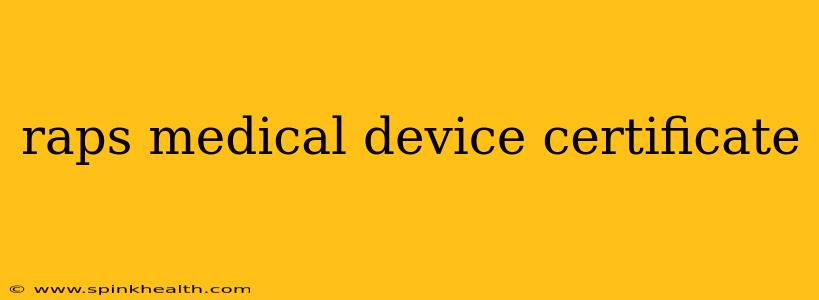Decoding the RAPs Medical Device Certificate: A Journey Through Regulatory Compliance
The world of medical devices is intricate, governed by a complex web of regulations designed to ensure safety and efficacy. One crucial element in navigating this landscape is understanding the role of the Regulatory Affairs Professional (RAP) and their associated certificates. This isn't just a piece of paper; it's a testament to expertise, a key to unlocking market access, and a crucial component of patient safety. Let's delve into the world of RAPs and their medical device certifications, unraveling the mysteries and highlighting the significance of this specialized field.
My journey into the world of medical device regulation began years ago, fueled by a fascination with the intersection of technology, healthcare, and meticulous compliance. I quickly learned that a successful product launch hinges on much more than just a brilliant invention; it requires a deep understanding of the regulatory maze. This is where the RAP steps in, acting as the bridge between innovation and compliance.
What is a RAP in the Medical Device Industry?
A Regulatory Affairs Professional (RAP) is a specialized professional responsible for guiding medical devices through the complex regulatory processes required for market access and ongoing compliance. Think of them as the navigators of the regulatory seas, ensuring a smooth and compliant journey for their medical devices. Their knowledge encompasses a broad range of regulations, standards, and guidelines, making them essential members of any medical device company. Their expertise doesn't end with the initial market approval; it extends to post-market surveillance and ongoing compliance.
What types of certificates are related to RAPs in the medical device industry?
There isn't one single, universally recognized "RAPs Medical Device Certificate." Instead, competency in regulatory affairs is often demonstrated through a combination of factors:
-
Education and Training: Many RAPs hold degrees in related fields like engineering, biology, or regulatory affairs. Furthermore, continuous professional development is crucial, encompassing certifications, courses, and workshops focusing on specific regulations and standards.
-
Experience: Practical experience is paramount. Years spent working within the medical device industry, navigating regulatory submissions, and managing compliance requirements build invaluable expertise.
-
RAC Certification (Regulatory Affairs Certification): While not strictly a "medical device certificate", the RAC is a globally recognized certification demonstrating proficiency in regulatory affairs. This signals a commitment to ongoing professional development and a higher level of expertise. This is a valuable asset for anyone seeking a career in this field.
-
Specialized Training & Certifications: Depending on the specific medical device and target market, additional training and certifications focused on particular regulations (e.g., FDA 510(k) submissions, EU MDR) might be required or highly beneficial.
Essentially, the "certificate" is a culmination of education, experience, and continuous learning, rather than a single document.
How important is it to have a qualified RAP on the medical device team?
The importance of a qualified RAP cannot be overstated. Navigating the complex landscape of regulatory requirements is a critical success factor for medical device companies, both large and small. A skilled RAP can:
-
Minimize delays and costs: By ensuring compliance from the outset, a RAP helps avoid costly delays and potential product recalls.
-
Reduce the risk of regulatory non-compliance: Their expertise mitigates the risk of costly fines and potential legal repercussions.
-
Facilitate faster market access: By streamlining the regulatory process, they help bring life-saving innovations to market more quickly.
-
Enhance patient safety: Ensuring compliance with rigorous standards is paramount to protecting patient health and safety.
What are the typical responsibilities of a RAP in the medical device industry?
The daily work of a RAP is diverse and demanding. Their responsibilities can include:
-
Regulatory strategy development: Creating a roadmap for navigating the regulatory landscape.
-
Regulatory submissions: Preparing and submitting documents to regulatory bodies.
-
Compliance monitoring: Ensuring ongoing compliance with regulations and standards.
-
Post-market surveillance: Tracking product performance after market release.
-
Responding to regulatory inquiries: Communicating with regulatory agencies to address any questions or concerns.
What are the career paths for someone with a RAP certificate?
A background in regulatory affairs offers several career paths within the medical device industry. This could involve working for a manufacturer, a regulatory consultancy, or even a regulatory agency itself. The demand for skilled RAPs continues to grow, making it a rewarding and stable career choice.
The journey to becoming a successful RAP involves more than simply obtaining a certificate; it's about accumulating knowledge, experience, and a deep understanding of the regulatory environment. It's a field that demands precision, attention to detail, and a genuine commitment to ensuring the safety and effectiveness of medical devices for patients worldwide. The work is challenging, but the rewards of contributing to improved healthcare are immeasurable.

